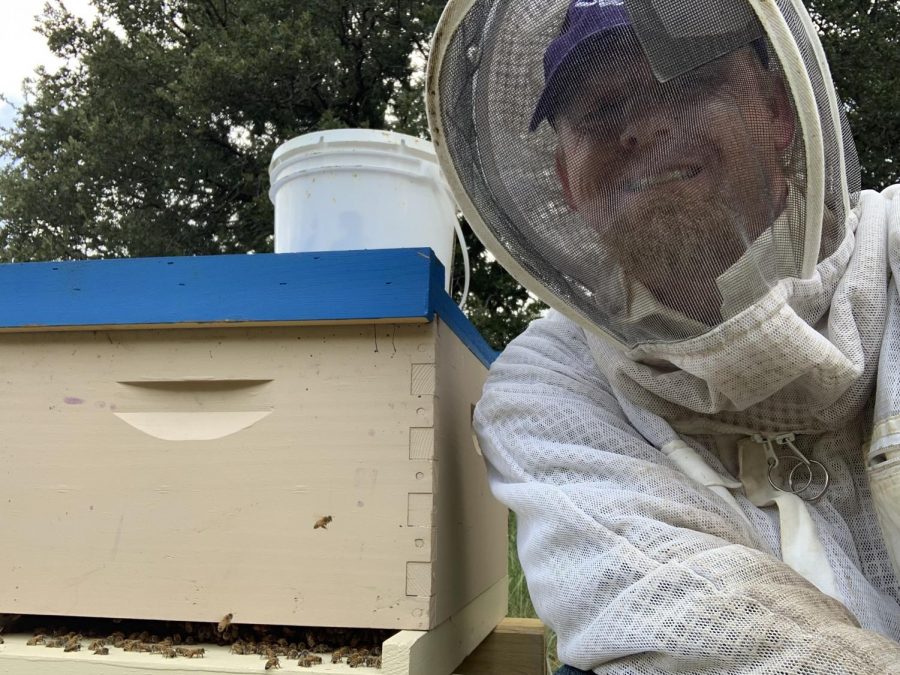Erath County Agriculture Spotlight: All About Beekeeping
Tarleton Alumni shares the importance of beekeeping.
Photo courtesy of Patrick Kostecka
Patrick Kostecka and one of over 40 hives he maintains. This one is a Langstroth hive, one of the most commonly used.
Agricultural education has been a part of Tarleton State University since 1917. Today, many graduates and alumni go on to become agriculturalists and advocates all over the world, and some even make an impact here in Erath County.
Beekeeping is one of the many forms of agriculture that is practiced across Erath county.
“Pollinators are a vital part of agricultural production . . . If we do not have honey bees to pollinate crops, our food diversity would be slim pickings at the grocery store,” Tarleton alumni and beekeeper, Patrick Kostecka stated.
According to kshoneybees.com, Kostecka began beekeeping in spring of 2013, and now maintains over 40 hives. He shares that his favorite thing about beekeeping is that learning is never ending.
“There’s always something you learn, from either you saw someone else show you a tip to make things work better in your operation or you can teach someone else. Just because I have nine years of learning about beekeeping doesn’t mean that the learning stops there, you hear from beekeepers 20 to 30 years in they say they still learn something,” Kostecka stated.
Kostecka reports that honeybees are actually the only insect to produce food for humans. Along with this, although honey does crystallize, it actually doesn’t expire. Honey can be heated up and resume its liquid state after crystallizing. Kostecka added that understanding how many crops bees pollinate is very important to the agriculture industry, bees pollinate roughly 130 agricultural crops. This includes nuts, berrys, vegetables and more.
“It’s very essential [to agriculture,] honeybees are pretty much the best pollinator there is out there. The USDA says that honey bees contribute to billions of dollars in pollinating services. Crops for example, almonds out in California are pretty much the largest pollinated crop in the United States or world. Beekeepers across the United States travel out there in February, March or April to just pollinate almonds. Some other crops [include] cherries, blueberries or canola,” Kostecka shared.
According to usda.gov, beekeepers today find themselves with declining hive numbers. From the 1940’s to 2021, the U.S. has seen hive numbers drop by 4.5 million, leaving 2.5 million hives standing today. There is not one sole reason for a decline in hives, but the causes include but are not limited to; parasites, diseases, nutrition, air and soil.
“Most commercial bee operations are several generations of families operating the business learned from one generation to the next. So there’s not more people getting into commercial operations to make a living. It’s hard dedicated work to do. Most beekeepers are hobbyists and only do it for a few years and give up over time. They end up selling equipment and move on,” Kostecka shared.
The USDA states that beekeeping improves overall bee and hive health as well as helps develop good hive management. Beekeeping tends to the large supply and demand of pollinating crops in the agriculture industry as well as general bee production.
“Anybody [can get into beekeeping,] of course safety is the biggest component of this. You wanna wear a full suit, a veil, jacket, or gloves, things of that nature before you even step out into an aviary,” Kostecka said. “Folks that are not beekeepers can help in various ways. Buy local honey or products from a beekeeper in your area. Don’t over use pesticides, plant flowers that benefit honey bees and pollinators in your area.”
To learn more about Tarleton alumni, Patrick Kostecka and his small business, visit www.kshoneybees.com. To find more information on how to get involved, visit the Texas Beekeepers Association at texasbeekeepers.org/events. For more information on beekeeping and its impact to agriculture, visit www.nal.usda.gov/afsic/beekeeping.



